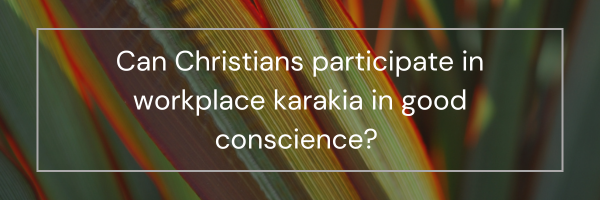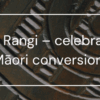Increasingly, workplaces are adopting the practice of starting and ending meetings with a karakia (prayer). This is intended to express respect for Māori tikanga (protocol) and the bicultural partnership enjoined upon all New Zealanders by the Treaty of Waitangi. If this was the only consideration, then Christians would have nothing to object to and much to value. However, the increasing adoption of traditional forms of karakia that invoke pre-Christian Māori atua, raises concerns for many Christians that participation in such prayers compromises their allegiance to Christ.
Such concerns need to be taken seriously and carefully thought through, and not simply dismissed as reactionary or an expression of prejudice.
For Christians, all language is seen as a gift of God and can be used to express his glory. Consequently, there should be no concern from a Christian perspective about the use of te reo Māori for karakia. After all, Māori was the first Gospel language of New Zealand, and is the language of the first people to settle in New Zealand.
Christian karakia should always be acceptable to Christians, and should also always be seen as acceptable within a te ao Māori context and worldview, and as widely acceptable in any New Zealand context. The use of Christian karakia is an authentically Māori practice that has a tradition stretching back to the conversion of Māori to Christianity in the first half of the nineteenth century.
In more recent years, some people have sought to re-introduce forms of karakia that invoke the traditional Māori gods of pre-Christian times. Whether these traditional karakia have a continuity of use that pre-dates Christian times is a matter of conjecture. Having said that, the Te Puni Kōkiri (Ministry of Māori Development) gives examples of both traditional and Christian karakia on their website.
As Christians, we acknowledge that Christ is Lord of all and has a name that is above every name. While this does not necessarily mean for the Christian that all reference to traditional Māori gods needs to be banished entirely, they do need to be dethroned from assuming a place of power and authority over believers. While there are still references to the pagan gods within English language and literature, it is clear that such pagan gods’ power and authority has been replaced by that of Christ. For Christians, whether Māori or Pākehā, the same will apply to the Māori atua of pre-Christian times. Although some may wish to see some form of syncretic pantheism as a possible future spiritual foundation for New Zealand, Christians will always resist such an idea and will always be uncomfortable when people weaponise karakia/prayer for their own political objectives.
For Christians, karakia can never be just a matter of tikanga (custom) devoid of spiritual significance, just a form of words with no power to achieve the purpose of which they speak. While modern forms of karakia are often intentionally designed to be spiritually “neutral”, these secularised forms of karakia represents a significant departure from a Christian understanding of karakia. For Christians, karakia is a petition to a gracious God who hears and answers our prayers. In fact, for many early Māori converts, it was their experience of the power of Christian karakia that lead to their confession of Christianity.
Merely being present while karakia is said should not be seen by Christians or anyone else as, in itself, a compromise to their faith or worldview. Christians and others can listen respectfully to karakia, on those occasions when it expresses a viewpoint they disagree with, without feeling that their mere presence is an endorsement of what is being said. Likewise, when Christian karakia is said, whether in te reo Māori or English, Christians hope that people of different religious viewpoints would listen respectfully and not feel the need to interrupt or withdraw. That is how it is in the New Zealand Parliament where a Christian prayer is recited at the beginning of each sitting day. It is not to be expected that everyone in the Parliament agrees with the content of the prayer, but all are expected to be respectful. Christians may be concerned, however, when their participation or presence could be misinterpreted and become a point of stumbling for a weaker brother or sister in the faith. As is outlined in Romans 14, Christians have freedom to follow their conscience without passing judgement on others. Consequently, depending on the particular circumstances, it may sometimes be appropriate for Christians to withdraw their presence, and this is to be respected.
It can be both helpful and informative when karakia is used with a translation paraphrase being made available. While it shouldn’t ordinarily be necessary to interrupt proceedings to give translations in English, access to the written sources and appropriate translations would go a long way to easing Christian concerns.
Most people are not particularly impressed when karakia simply becomes a perfunctory action in order to tick the corporate box on Treaty compliance. Christians, however, should always be happy to pray for their workplace knowing that such karakia is spiritually powerful when addressed to the true God through Jesus Christ by the Holy Spirit. Christians should welcome the opportunity to pray for God’s blessing on their meeting with colleagues, knowing that God alone brings the harmony and unity of purpose which makes for a productive workplace.
I know of instances when Christians have been asked by their colleagues to offer a prayer before a meeting, and, not having a facility with te reo, have done so in English without any offence being caused. Surely, this fulfills the spiritual intention of karakia even though it might not conform to what is expected. But much better would be for Christians to take the time to learn a Christian karakia in te reo Māori so that they might be ready to give a short karakia when asked. See below for some suitable prayers to use.
The following is a opening karakia that could be used for that purpose drawn from the Prayer Book of the Anglican Church, page 141.
|
E te Atua tō mātou Kai-hanga, |
God our Creator, when you speak there is light and life, when you act there is justice and love; grant that your love may be present in our meeting, so that what we say and what we do may be filled with your Holy Spirit. |
At the end of a meeting, the following could be said (again taken from the Anglican Prayer Book, page 52):
|
Kia tau ki a tātou katoa |
The grace of our Lord Jesus Christ, and the love of God, and the fellowship of the Holy Spirit be with us all. Amen. |
If you are called on to say Grace before a meal, the following prayer would be suitable (taken from Bishop Muru Walters’ Māori Language for Ministry, 1992):
| Kia inoi tātou.
E te Atua tohu, e te Atua aroha, manaakitia mai ēnei kai, hei oranga mō ō mātou tinana, whāngaia hoki ō mātou wairua ki te Taro o te Ora, ko Ihu Karaiti hoki tō tātou Ariki, Amine. |
Let us pray.
Merciful and loving God, bless this food, to keep our bodies healthy, and feed our spirits with the Bread of Life, for Jesus Christ is our Lord, Amen. |









0 Comments